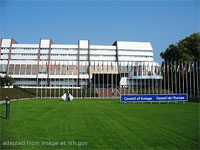State Duma speaker deems CoE pressure over family violence decriminalization by Russia to be inadmissible

MOSCOW. Jan 18 (Interfax) – State Duma Speaker Vyacheslav Volodin deems the pressure of Council of Europe (CoE) Secretary-General Thorbjorn Jagland on Russia in connection with the law decriminalizing family violence to be inadmissible.
“This is pressure, and it is inadmissible,” Volodin told the press on Wednesday.
The State Duma adopted the amendments in first reading in January, and the second reading is due on Friday.
Jagland sent a letter to the heads of the State Duma and the Federation Council to express his concern about the possible adoption of a law which would decriminalize the first occurrence of domestic violence. “I call upon you to do anything within your powers to strengthen the right of Russian families to live free from violence and intimidation,” he said, adding “The physical and psychological abuse of women is an extremely serious crime and an assault on their human rights, Jagland wrote. Domestic violence also harms children, either as its direct victims or as witnesses.”
Volodin recalled his meeting with Jagland in December 2016; he said Jagland told him “it would be incorrect and wrong to interfere in the competence of the Parliamentary Assembly of the Council of Europe” when the question of depriving the Russian delegation to PACE of the vote had been raised. “Now that we speak about decisions of the State Duma, it is a competence of State Duma deputies,” Volodin said.
He described Jagland’s interference in the proceeding between the first and second hearing of the bill as pressure exerted on Russian parliamentarians in regard to an exclusive point of the national law.
He said the deputies were guided with the principle of non-interference in family affairs.
“This is a very delicate issue, and we will definitely keep in mind the public opinion, the public response to this issue, during the second hearing. We have sociological data, and we will certainly make it public. However, we will proceed from the stance of our voters, the will of Russian citizens, while all is the rest is inference in parliamentary affairs, moreover that in the course of adoption of a law,” Volodin said.
Perhaps, representatives of European countries “know better how to regulate matters in European families, which have their own traditions,” he said.
He also pointed to the breach of democratic norms and parliamentary procedures at PACE. “Whenever a national delegation is stripped of the vote, whenever fundamentals of parliamentarianism and democracy are made null and void, this is obviously worthy of being noticed, and a similar letter should be sent to PACE, indicating the inadmissibility of depriving national delegations of the vote and of encroaching on fundamentals of parliamentarianism in such an esteemed body; we would certainly support Mr. Jagland in that case,” he said.
The bill, which passed the first reading in the State Duma last week, decriminalizes battery of family members but only if this is the first offense. The beating of family members and other close relatives will be treated as an administrative offense, while a repeat crime will be seen as a misdemeanor.
“Reducing ‘battery within the family’ from a criminal to an administrative offence, with weaker sanctions for offenders, would be a clear sign of regression within the Russian Federation and would strike a blow to global efforts to eradicate domestic violence,” Jagland said.
He reminded that “the Russian Federation is bound by the European Social Charter, which requires State Parties to protect children against violence.”
“Russia is one among four out of 47 member States of the Council of Europe who have neither signed nor ratified the Istanbul Convention (“Convention on preventing and combating violence against women and domestic violence”) that criminalizes all acts of physical, sexual or psychological violence within the family and between former or current spouses and partners,” the secretary-general said.
